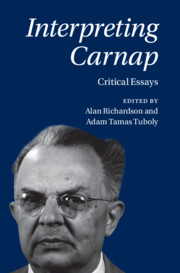Book contents
- Interpreting Carnap
- Interpreting Carnap
- Copyright page
- Contents
- Contributors
- Acknowledgments
- Abbreviations
- Introduction
- Part I Philosophy in New Dress
- Part II Naturalism and Method
- Chapter 5 Shades of Naturalism
- Chapter 6 On Quine’s Epistemological Objection to Carnap’s Analyticity
- Chapter 7 Carnapian Explication
- Part III The Logical and the Linguistic
- Part IV Science and Theories
- Bibliography
- Index
Chapter 6 - On Quine’s Epistemological Objection to Carnap’s Analyticity
from Part II - Naturalism and Method
Published online by Cambridge University Press: 01 February 2024
- Interpreting Carnap
- Interpreting Carnap
- Copyright page
- Contents
- Contributors
- Acknowledgments
- Abbreviations
- Introduction
- Part I Philosophy in New Dress
- Part II Naturalism and Method
- Chapter 5 Shades of Naturalism
- Chapter 6 On Quine’s Epistemological Objection to Carnap’s Analyticity
- Chapter 7 Carnapian Explication
- Part III The Logical and the Linguistic
- Part IV Science and Theories
- Bibliography
- Index
Summary
Carnap’s naturalism evidently differs from Quine’s, but the precise nature of this difference has proven elusive. This chapter focuses on what Quine defends as his “provincial” naturalism against a Carnapian “cosmopolitan” alternative. The problem with this contrast, however, is that Quine does not represent a pure form of what he calls a “provincial” view. This is illustrated by his tergiversations about analyticity; after initially denying that there was even an explicandum worth bothering about, he later offered his own ordinary-language-based account of analyticity, without feeling any need to supply a more exact explication; there would appear to be no way to resolve the resulting stand-off with the cosmopolitan standpoint. This paper suggests a more robust explicandum for analyticity (and cosmopolitanism more generally). We come back, in the end, to the confrontation between Carnap and Quine in Chicago in 1950, where Carnap convinced Quine that their differences did not concern any question about which there could be right or wrong, correct or incorrect; it is regretted that Quine soon lost this lesson from sight.
Information
- Type
- Chapter
- Information
- Interpreting CarnapCritical Essays, pp. 106 - 126Publisher: Cambridge University PressPrint publication year: 2024
